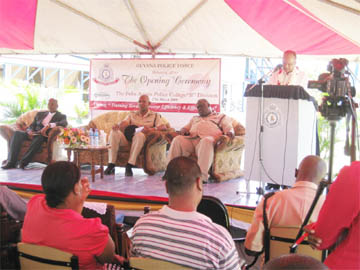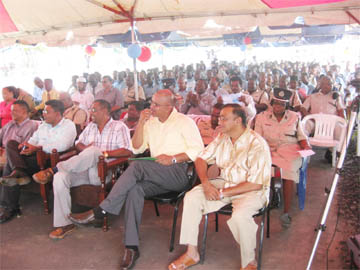-Rohee urges Berbicians to embrace it
At the recommissioning of the Felix Austin Police College yesterday Berbicians were encouraged to embrace the recruitment drive and make maximum use of the facility which is crucial to the ‘B’ Division.
Minister of Home Affairs, Clement Rohee said that “with a force of 800 plus short… it is my expectation that those in charge of recruitment and training will recruit many Berbicians, male and female without discrimination…”
He said the college at Adventure, Corentyne was seen as a practical and cost-effective solution due to the difficulties that are usually encountered in sending ranks to Georgetown. The basic training could be provided in Berbice.
“It is my hope and expectations that the training programmes of this facility would be designed in such a manner that the generally high quality of training that is provided to ranks in Georgetown is effectively duplicated at this college,” the minister said.
He hoped that at the commencement of training persons from the Berbice area and beyond would be attracted to join the force.
Rohee thanked the Central Corentyne Chamber of Commerce (CCCC) which was the driving force behind the rehabilitation of the facility and the administration of Region Six that sought funding for the project through his ministry.
Gratitude was also expressed to the Dipcon Contracting Company for resurfacing the tarmac at a cost of US$10,000, AH & L Kissoon Limited which donated mattresses and Citizen’s Bank which donated a computer as well as other companies and organizations that have made contributions towards the structure.
Former Commander ‘B’ Division Clinton Conway who is also the Assistant Commissioner was instrumental in having the project done but Rohee said that the present Commander, George Vyphuis now has the “heaviest of responsibilities” to ensure that the project is sustained.
The minister said that training is vital for the new entrance to the Guyana Police Force (GPF) because “we are living in an era where many challenges are posed to policing” such as changing values, the global economic turmoil and the increase in persons being involved in violence.
Generally, he said the police are dealing with a society that is going through rapid changes and affects the way policing is being done.
In addition to the training of the regular members of the force and members of the special constabulary, the facility would be ideal to provide training to members of the Neighbourhood Police and members of the Community Policing Groups in ‘B’ Division so they can “better able to serve their communities.”
He mentioned too that government has allocated $145M for the rehabilitation of buildings belonging to the GPF around the country.
He called on the management of the force in ‘B’ Division to constantly maintain and upgrade the facility.
He also recommended that a “dedicated oversight committee comprising the same partners who came together to make the rehabilitation a reality” be formed.
Further, the minister said that the success of the project “was a classic example” of the partnership between the police and members of the community and was looking forward to the commissioning of a fire station at Rose Hall. That project was also undertaken by the CCCC.
In his remarks, Commissioner of Police, Henry Greene said he was proud to be heading the force at the time when the training college was being re-commissioned.
He too recognized the importance for the force to interact with the community, mentioning that “90% of the community is decent-minded people.” He said the 10% who decide to be lawless are “those who the chamber was worried about… if they decide to be lawless we would deal with them.”
Meanwhile he agreed with Country Representative of the United Nations Children’s Fund, Doris Roos that the police should take reports of abused women seriously.
Greene told officers that “when a woman goes to the station to report incidents of abuse she is going because she needs help. She is running from home to the station because she needs help and it is the only place she can go.” He said instead of telling the woman she should “go home and make up with the man” they should deal with the issue.
Crime wave
Conway said that the CCCC was concerned with the crime wave in Georgetown at the time and summoned him and his senior officers to a meeting to discuss how they would be able to handle the situation.
He said he took the opportunity to throw out the challenge to them to help in the rehabilitation of the college.
Chairman of the CCCC, Poonai Bhigroog immediately committed $100,000.
Bhigroog remarked that after visiting the site he realized the money “could barely do to pay a pest control officer to get rid of the termites that had infested the building.”
He said they “had to up the tempo” and solicited donations from the business community on behalf of the force. According to him, Traffic Chief, ‘B’ Division, Owen Trotz also arranged for the prisoners to clear the “jungle” in the compound.”
Trotz, he said also played a major role in getting Dipcon to resurface the tarmac and BK International to assist with the front of the building.
The chamber also raised funds to complete the dormitory, building a new kitchen and painting of the two buildings; spending much more than they had budgeted for.
At this stage, he said, with “no more fund to continue we invited the regional chairman to visit the college…” Thereafter funding was acquired from government to complete the project.
Conway who is also the Force Training Officer said that 14 recruits were already sworn in and background checks are currently being done on 22 more persons.
The college was constructed in 1990. Rehabilitation commenced last September and was completed at the end of December.


